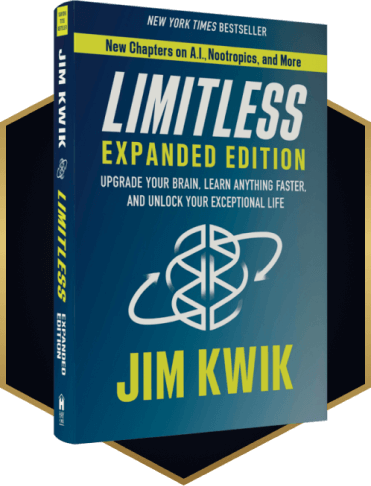Memorize Scripts & Lines Quickly (Hollywood Secrets Part 1)
Have you ever wondered how actors can memorize a movie-length script? In the first half of this two-part episode, I reveal the “Hollywood Secrets” to memorizing anything word-for-word.
Join Our Growing Facebook Community: www.KwikBrain.com

Jim Kwik
How do you memorize things word-for-word, whether it’s poetry or lines a sales script?
Discover the 12 R’s to Memorizing Word-for-Word. Write them down. If you’ve gone through a Kwik Learning memory program, you know you can also memorize them via the chain-linking method.
Why might you want to memorize something word-for-word? You might want to show someone you’re an expert in your field and advancing in your career. You might be nervous about public speaking or want to be romantic and recite a poem.
12 Rs to Memorizing Word-for-Word (Part 1)
1. Read
- You must read before you remember, so have whatever you need to memorize in front of you.
- Read with your finger or a visual pacer to improve your speed, focus, and comprehension.
- Your sense of sight and touch are closely linked, so you’ll recall the information better when you use more senses.
- Your eyes are attracted to motion, so underlining as you read with a visual pacer improves your focus and reading speed 25 – 50%.
2. Reflect
- As you sit and read, consider the meaning behind the words.
- Associate meaning and emotion behind what you’re memorizing.
- What does it mean? What is your outcome? What is your motivation – or motivation for action?
- Actors call this process of stepping into someone else’s motivation “active experiencing.”
- Emotion is so important to memory because emotion tied to information becomes a long-term memory.
3. wRite
- Write down what your reflections are.
- Actually writing by hand instead of typing will help you start to own those words because they feel like they’re yours.
- Hand writing the reflections helps you learn the information kinesthetically.
- Studies suggest that by hand writing information, you retain it upwards of 40% or more.
4. Repetition
- Repetition is power. There is no substitute for doing the work.
- After reading, reflecting, and writing — repeat.
- Spaced repetition is the optimal way of consolidating short-term memory into a long-term memory.
- Rehearse and review the information 1 hour later, 1 day later, 1 week later, and 1 month later.
5. Run your lines
- In our Kwik Reading program, we talk about comprehension. There is a stage of comprehension called “relating,” where you’re talking to someone else.
- Role-play the lines with a partner.
- Something about having a live audience makes you active and present in the moment.
6. Resources
- Resources are tools or technologies that can support you.
- If you don’t have someone you can run lines with, try an app called Rehearsal.
- Technology might weaken our brains, but it also makes things more convenient — so use it to your advantage.
Enjoyed this episode? Tune in next week for part 2!







